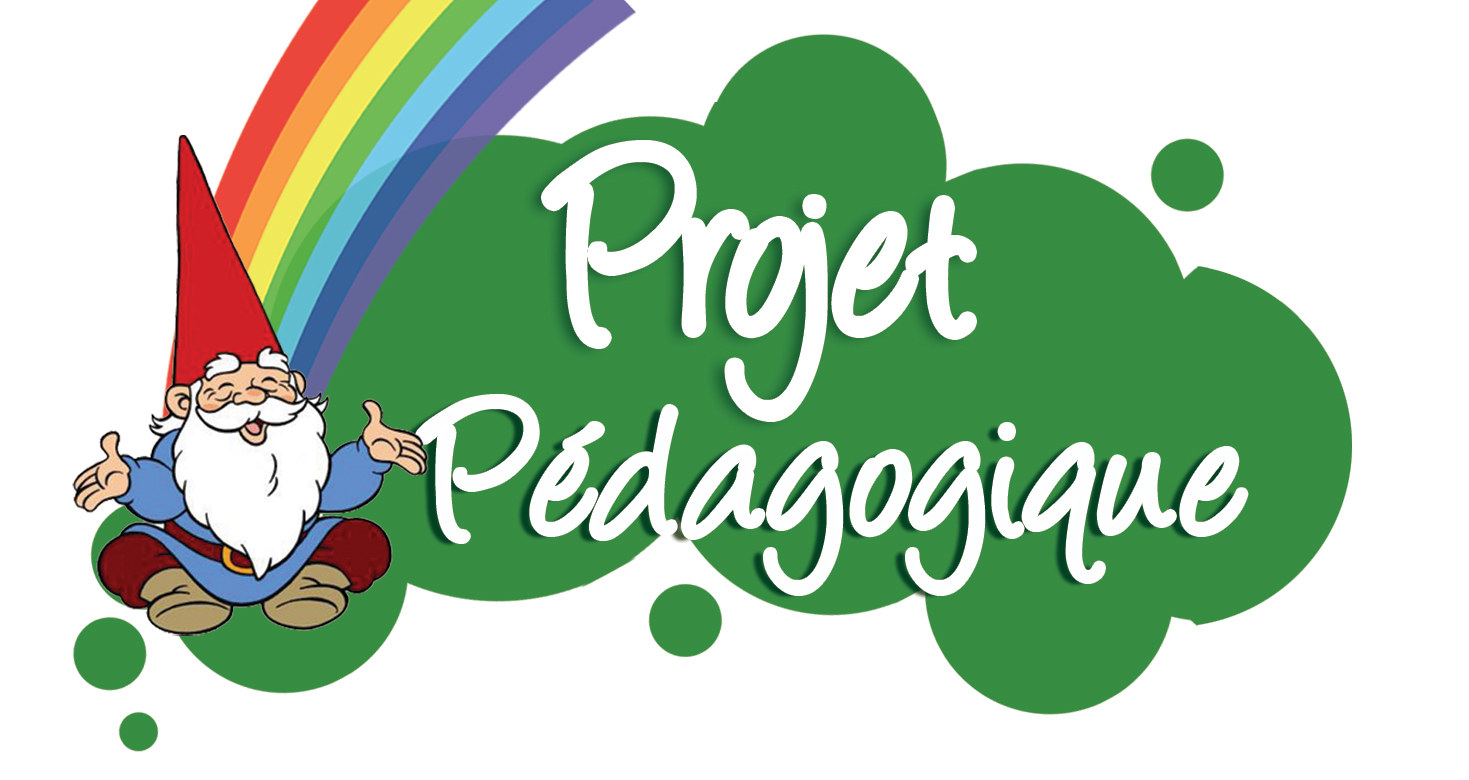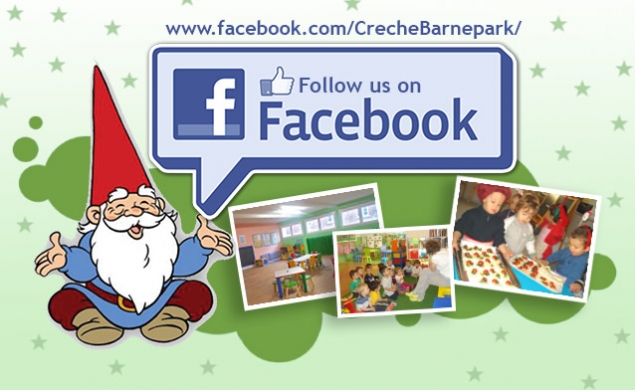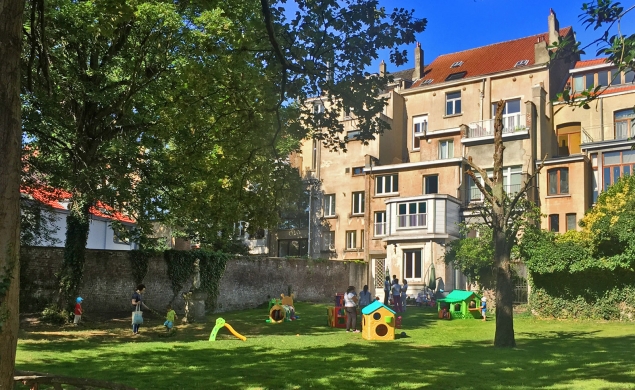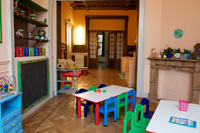
Our project's name is Barnepark, inspired by a traditional thatch roof house located in the middle of a Scandinavian forest . The house is furnished with simple and basic fittings such as: a long table and small chairs, a sink and a cooking stove, drawings that decorate the wall, a closet, a little bookcase and few more furniture items.
Barnepark represent the real first contact between Nature and child, a pure immersion in a total and harmonic wellness that will guide the child in his evolution and growth.
The figure that accompanies us in this trip is a "Nisse" (Scandinavian name to indicate a gnome)
Barnepark project takes his origins in the Mediterranean civilization that sometimes seems to lose sight of the value of Mother Nature; the project is enriched by the Nordic cultural values in which Nature roots and identity are well established.
Barnepark is then the ideal meeting point able to connect these two worlds which seem at first sight to be logistically and culturally far from each other.
The core idea of the pedagogical project is a day care located in the middle of multi-ethnic Europe, where the "little citizen" from all the European Countries will find themselves in a common culture and rediscover the love and respect for Nature.
In a society able to look towards the future, children teach adults to find ‘the child within them’ and therefore to regain their humanity, their love for Nature and their love for other human beings.
We strongly believe in an educational system where knowledge is not passively transmitted to children but where the child is taught to become an important member of our society.
Furthermore we believe that children are capable of becoming an active part in our society. Our society will be enriched by their positive values which are: creativity, happiness, honesty, enthusiasm, and desire for human interactions.
In order to guarantee a future for our children is it necessary to recover these values.
As previously stated, in our pedagogical project the children are main actors in the educational process. When properly guided by an adult, children are capable of actively participate to this educational process which is full of experiences and knowledge.
The educational process is shaped like a path which is walked with rationality and deliberateness. The main goal of this path is to reach specific objectives. These objectives are:
- Consistencies between adults and teachers
- A common language
- Sense of belonging to a community that shares the same values
An import aspect of the Barnepark pedagogical project is the personal and relational development of the child; it is in these skills where the basis for their growth is set.
"Only one thing to say to ourselves. That children are different one from each other, historic moments and every moment of the same child are different, countries, environments and families are different". Different languages, families, children, like a metaphor of suburbs that escape from logical centrifuges " trainer, to goad to plurally decline teaching-understanding methodologies, conceiving child like an "educator" of his educators". (Freire)
In the Barnepark project, the fundamentals principles defining the daily activities of the daycare have been set out considering multiple dimensions:
- space and time
- social/cultural environment
- a combination of cultures
- an historical background concerning our relationship with the child
- an historical background concerning knowledge and scientific research
- family histories
Professionals and parents should make choices to build values that will direct child 's education.
Our educational choices spring from the following ideas:
The child…
- is healthy, strong, competent, curios;
- has his own skills;
- is open to the new, provided with great energy and willpower to growth;
- develops his potential by his relationships with other children, with adults and with the environment;
- develops himself in his entirety ( emotional, social, cognitive capacities);
- easily fits in a multicultural and multilanguage contest;
- easily fits in a natural contest that sustains is development;
- is a leading actor that assimilates and produces knowledge;
“Child is an active person since from his birth, is a citizen with his place in the society, is leading actor of rights, and society must sustain and respect him.
Child is rich: born with a potential that could express in multiple languages, is a builder of consciousness, of identity, of cultures and values, finding since from his birth the sense of the world.
Child is able to live, to learn, to listen and to communicate. (Irene Balanguer)
In order to establish a positive relationship with the child and his family, to organize the environment and the daily routines, to manage all the children in different situations and activities, the daycare needs engagement, competence and sensibility.
It is essential to create a space that takes care of children's needs and abilities that offers elements and opportunities to satisfy them. This space will combine security and care requirements with needs of exploration and knowledge, feeling of intimacy with the pleasure to get along with others.
The Barnepark pedagogical project promotes situations that produce significant relationship through:
- setting up of interiors
- careful selection of the material proposed
- sharing external spaces
- thematic projects
- routine time
As we conceive the Child to be a ‘rich person’ we recognize his ability and capability to build his own knowledge. The child is: curious, able to explore, emotionally willing to invest himself, open to a constructive criticism.
The development of his skills allows him to engage in a path of knowledge towards himself, the others and the environment.
The ways in which child knowledge is promoted and encouraged are:
- playing
- music, singing
- graphic expression
- manipulation (wood, paper, clay, sand, natural materials, ...)
- symbolic games, theatre, puppets
- reading
- ‘nature’ language
- motricity and dance
- linguistic enrichment
Confrontation between pairs enables the child to respect other points of view, and to complete his own perspective. In this way the child overcomes his egocentrism and develops his social skills.
Multicultural integration is the central theme of Barnepark' s pedagogical project because interculturalism is a landmark for daily choices and educative proposals. On the other hand we are well aware that in our daycare each children and each family represents a "cultural world", a melting pot of identities and therefore new cultures and new differences co-exist.
In order to keep up with a multicultural environment since early childhood, the daycare works to stress the importance of the following aspects:
- differences should be considered as an enrichment in everyday life;
- the daycare should highlight other cultures;
- the child should be free to use his mother tongue while interacting ;
- different conceptions of child care modalities may be expressed, compared and exchanged.
One of our project parts draws attention to the fact that children should be divided in different classrooms accordingly to their age. Dividing children in groups allows the teacher to be more attentive to the child development level; moreover teachers can propose activities which are more adjusted to the child age and capacities.
The day care is then divided between Classrooms that we call Sections
In every Section, regardless of their age, the children are provided with:
- an area dedicated to the game
- an area dedicated to the meal-time
- an area to rest
- an area dedicated to the hygiene of the child;
Each Section provides the child with a place where he will establish unique relationships and build his own identity. Moreover, each Section offers personalized areas (ex: the child’s bed, the same sitting place at the table, his personal objects) that are similar to the areas existing at home and that create sense of security in the child.
The everyday life in the daycare is dived between ‘Routines’. The routine plays an important role since it marks the time in which the child receives special attention by the teachers. This time dedicated to the child influences the relationship between the child and the teacher positively.
Routines allow children to know and understand what is going on around them, where is it happening and with whom. Routines’ aim is for the child to understand and be able to anticipate his teacher’s actions. This occurs when the action is repeated every day at the same time by the same teacher’s. By providing this reliable organization of time and space the child will feel at ease in his surroundings.
- These Routines are:
- The morning welcome
- The lunch time
- The sleeping time
- The hygiene time
- Goodbye time in the evening
Nowadays when we think about a child playing, we don’t consider his playing as a serious matter, however in a child eyes playing is a serious matter and therefore it needs all of our attention. Through the action of playing the child is able to express his feelings and to develop his cognitive abilities.
The Barnepark project includes differents thematic projects that are easily set up to integrate the other activities and routines (non so se questa frase ha un senso).
To develop and expand child’s interests, a thematic project can be approached in different ways.
The development of the thematic projects allows children to:
- Increase their curiosity
- Meet other people points of view (the child, the other children, teachers, parents)
- Learn to focus, to seek knowledge, to explore.
- Learn to share their point of view, to negotiate and to decide together
The thematic project is adjusted to the child age and development.
Barnepark’s thematic projects are:
- Water
- Autonomy
- Art
- Ecology
- Summer
- Parties
- Reading
- Language
- English classes
- Music
- Lunch
- Physical motricity
- Solidarity
- Theatre












